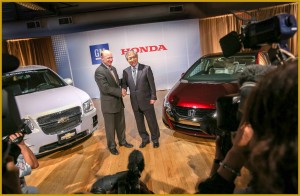
General Motors Vice Chairman Steve Girsky (left) and Honda North America President Tetsuo Iwamura announce an agreement to co-develop next-generation fuel cell system.
Toyota will sell hydrogen fuel cell hybrids by late 2014 or 2015 in the U.S., according to Bob Carter, Senior Vice President, Automotive Operations, Toyota Motor Sales. Speaking to the Automotive Press Association in downtown Detroit today, Carter said that the new fuel cell hybrid would be revealed for the first time at the Tokyo Motor Show.
Carter told AutoInformed that he has seen and driven the Toyota fuel cell hybrid. The ultimate timing for U.S. retail sales is dependent on California’s hydrogen infrastructure program that aims to put in place 35 hydrogen-refueling centers in the Los Angeles area by 2015.
This light duty fuel cell market has shown promise for decades, but the problem remains it is space age technology at corresponding NASA levels of cost. Not surprisingly, automakers have varying levels of interest in fuel cells that always appears to be just a few years or so from commercialization at $100,000-$400,000 per vehicle. This makes conventional $30,000-$100,000 battery electric vehicles or gasoline hybrids – currently a small fraction of the new vehicle market – look like bargains compared to what automakers would have to charge to make a profit on a fuel cell vehicle.
When hydrogen is used in a fuel cell in electric vehicles, the only vehicle emission is water. However, varying amounts of greenhouse gases are emitted during hydrogen production, and the low-greenhouse gas methods of making hydrogen are more expensive and will need further development to become competitive. Hydrogen fuel cell vehicles could become less costly than the advanced internal combustion engine vehicles of 2050. Fuel cell vehicles are not subject to the limitations of battery vehicles, but developing a hydrogen infrastructure in concert with a growing number of fuel cell vehicles will be difficult and expensive, according to the National Research Council.
“Key Japanese auto OEMs such as Honda, Toyota and Nissan and South Korea’s Hyundai/Kia are preparing their FCEV models for commercialization,” says Vijayendra Rao of Frost & Sullivan. “Cities in Japan such as Tokyo, Osaka, Nagoya, and Fukuoka, as well as Seoul and Ulsan in South Korea are targeted by OEMs for commercialization of fuel cell vehicles.”
Not surprisingly given the costs, the Japanese and South Korean Governments are subsidizing FCEVs. The Japanese government offers support for research and development and subsidies for hydrogen station infrastructure; while the South Korean government offers subsidies for R&D, and is setting up a hydrogen infrastructure along with oil companies.
The National Research Council report cited above also says that by the year 2050, the U.S. may be able to reduce petroleum consumption and greenhouse gas emissions by 80% from cars and small trucks with a combination of more efficient vehicles, and the use of alternative fuels such as biofuels, electricity, and hydrogen.
The study was sponsored by the U.S. Department of Energy’s Office of Efficiency and Renewable Energy. Not surprisingly, it also calls for “strong government policies to overcome high costs and influence consumer choices.”
The Research Council is the principal operating agency of the National Academy of Sciences and the National Academy of Engineering. It said, “while achieving these goals will be difficult, improving technologies driven by strong and effective policies could make deep reductions possible.”
NRC notes that improving the efficiency of conventional vehicles is “up to a point” the most economical and easiest-to-implement approach to saving fuel and lowering emissions. A process that is now well underway in the globally transportation industry due market forces as much as increasing stringent regulations and lavish taxpayer subsidies.
Read AutoInformed on:
- GM and Honda Target 2020 for Viable Fuel Cell EVs
- Scientists Urge Strong Government Policies to Cut Greenhouse Gas Emissions and Develop Alternative Fuels. Caveats Abound
- BMW and Toyota Sign Deal for Joint Fuel Cell and Battery Programs
- Japanese, South Korean Automakers to offer Fuel Cell EVs by 2015
- President Obama Calls for $2 Billion Energy Security Trust Using Fossil Fuel Development Taxes to Wean U.S. from Oil and Gas Germany to Add 35 New Hydrogen Fueling Stations
- UK Starts Hydrogen Fuel Cell Vehicle Project with Automakers, Utilities and Gas Suppliers – Cars on Road Promised by 2014
- Daimler and Honda Lead in Car Fuel Cell Development, Maybe
- U.S. Navy Accepts GM Equinox Hydrogen Fuel Cell Vehicle

